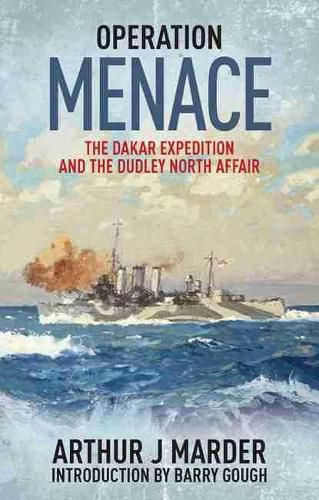Readings Newsletter
Become a Readings Member to make your shopping experience even easier.
Sign in or sign up for free!
You’re not far away from qualifying for FREE standard shipping within Australia
You’ve qualified for FREE standard shipping within Australia
The cart is loading…






Continuing on from Arthur Marder’s previous book, From the Dardanelles to Oran: Studies of the Royal Navy in Peace 1915-1940 this next volume investigates the Allied expedition of September that year, with De Gaulle present, which unsuccessfully attempted to break the French at Dakar away from the Vichy Government.
A pet operation of Prime Minister Churchill, the operation was undertaken against all advice, and it turned out to be a fiasco. In the author’s words, Menace exemplified, in its genesis, planning, and execution, all that can go wrong in warfare; an operation fouled up by unforeseen contingencies, the accidents of war, and human error, and against a background of undue political interference, inadequate planning, and half-baked co-operation between Allies.
Using Admiralty and Cabinet papers, as well as private sources of information, Marder weaves a skilled course through all the complex material to produce a masterly case-study of how an operation is mounted and how it can go disastrously wrong. It is a classic, tragicomic illustration of the fog of war
$9.00 standard shipping within Australia
FREE standard shipping within Australia for orders over $100.00
Express & International shipping calculated at checkout
Continuing on from Arthur Marder’s previous book, From the Dardanelles to Oran: Studies of the Royal Navy in Peace 1915-1940 this next volume investigates the Allied expedition of September that year, with De Gaulle present, which unsuccessfully attempted to break the French at Dakar away from the Vichy Government.
A pet operation of Prime Minister Churchill, the operation was undertaken against all advice, and it turned out to be a fiasco. In the author’s words, Menace exemplified, in its genesis, planning, and execution, all that can go wrong in warfare; an operation fouled up by unforeseen contingencies, the accidents of war, and human error, and against a background of undue political interference, inadequate planning, and half-baked co-operation between Allies.
Using Admiralty and Cabinet papers, as well as private sources of information, Marder weaves a skilled course through all the complex material to produce a masterly case-study of how an operation is mounted and how it can go disastrously wrong. It is a classic, tragicomic illustration of the fog of war